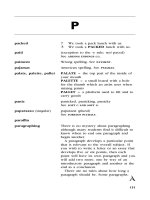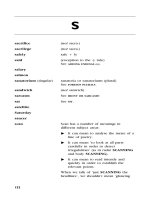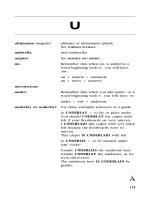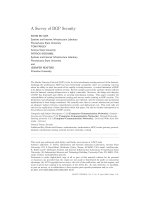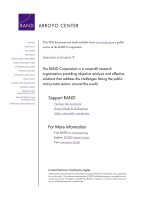Learning A Burt of Correct English_9 pptx
Bạn đang xem bản rút gọn của tài liệu. Xem và tải ngay bản đầy đủ của tài liệu tại đây (195.27 KB, 17 trang )
IcanQUOTE the whole poem. (quote
= a verb)
quotation marks See
INVERTED COMMAS.
146
QUOTATION MARKS
R
radiator (not -er)
radically radical + ly
radius (singular) radii or radiuses (plural)
See
FOREIGN PLURALS.
raise or rise? Let us look at these two words first as
verbs (doing words):
My landlord has decided to RAISE the
rent.
He RAISED the rent a year ago.
He has RAISED the rent three times in
four years.
My expenses RISE all the time.
They ROSE very steeply last year.
They have RISEN steadily this year.
Now let us look at them as nouns (a raise,
arise):
You should ask your employer for a
RISE.
You should ask your employer for a
RAISE.
An increase in salary is called ‘a rise’ in
the UK and ‘a raise’ in America.
raping or rapping? rape + ing = raping
rap + ing = rapping
See
ADDING ENDINGS (i), (ii).
rapt or wrapped? RAPT =enraptured(RAPT in thought)
WRAPPED = enclosed in paper or soft
material
raspberry (not rasberry)
ratable/rateable Both spellings are correct.
147
realise/realize Both spellings are correct.
really real + ly
reason
reasonable
reccomend Wrong spelling. See
RECOMMEND.
receipt See
EI/IE SPELLING RULE.
receive See
EI/IE SPELLING RULE.
recent or resent? RECENT = happening not long ago
RESENT = to feel aggrieved and be
indignant
recipe
recognise/recognize Both spellings are correct.
recommend
recover or re-cover? Bear in mind the difference in meaning
that the hyphen makes:
RECOVER = get better, regain possession
RE-COVER = to cover again
See
HYPHENS (iv).
rediculous Wrong spelling. See
RIDICULOUS.
refectory (not refrectory)
refer referred, referring, referee, reference
See
ADDING ENDINGS (iv).
referee or umpire? REFEREE = football, boxing
UMPIRE = baseball, cricket, tennis
refrigerator (abbreviation = fridge)
regal or royal? REGAL =fitforakingorqueen;
resembling the behaviour of a king or
queen
ROYAL = having the status of a king or
queen, or being a member of their family
regret regretted, regretting, regrettable, regretful
See
ADDING ENDINGS (iv).
148
REALISE/REALIZE
rehearsal
rehearse
relevant (not revelant)
relief See
EI/IE SPELLING RULE.
remember (not rember)
repellent or repulsive? Both words mean ‘causing disgust or
aversion’. REPULSIVE,however,isthe
stronger of the two; it has the sense of
causing ‘intense disgust’, even horror in
some circumstances.
REPELLENT can also be used in the
sense of being able to repel particular
pests (a mosquito repellent) and in the
sense of being impervious to certain
substances (water-repellent).
repetition (not -pit-)
repetitious or Both words are derived from ‘repetition’.
repetitive? Use REPETITIOUS when you want to
criticise something spoken or written for
containing tedious and excessive
repetition. ‘Repetitious’ is a derogatory
term.
Use REPETITIVE when you want to
make the point that speech, writing or an
activity involves a certain amount of
repetition (e.g. work on an assembly line
in a factory). ‘Repetitive’ is a neutral
word.
reported speech See
INDIRECT SPEECH/REPORTED SPEECH.
representative
repulsive See
REPELLENT OR REPULSIVE?.
resent Se e RECENT OR RESENT?.
reservoir From ‘reserve’. (not resevoir)
resistance
RESISTANCE
149
reson Wrong spelling. See REASON.
resonable Wrong spelling. See
REASONABLE.
responsibility (not -ability)
responsible (not -able)
restaurant
restaurateur (not restauranteur)
resuscitate (not rescusitate)
revelant Wrong spelling. See
RELEVANT.
revenge See
AVENGE OR REVENGE?.
reverend or reverent? REVEREND = deserving reverence; title
for a cleric.
The Revd. C. Benson
The Rev. C. Benson
REVERENT = showing reverence
REVERENT pilgrims
reversible (not -able)
rheumatism
rhubarb
rhyme
rhythm
ridiculous (not rediculous)
The word comes from the Latin ridere,
meaning ‘to laugh’.
rigorous or vigorous? RIGOROUS = exhaustive, very thorough,
exacting physically or mentally
VIGOROUS = full of energy
robing or robbing? robe + ing = robing
rob + ing = robbing
See
ADDING ENDINGS (i) and (ii).
rococo
150
RESON
Romania/Rumania Both spellings are correct.
A third variant, Roumania, is now
considered old-fashioned and should be
avoided.
roof (singular) roofs (plural) (not rooves)
royal See
REGAL OR ROYAL?.
ROYAL
151
S
sacrifice (not sacra-)
sacrilege (not sacra-)
safely safe + ly
said (exception to the -y rule)
See
ADDING ENDINGS (iii).
salary
salmon
sanatorium (singular) sanatoria or sanatoriums (plural)
See
FOREIGN PLURALS.
sandwich (not sanwich)
sarcasm See
IRONY OR SARCASM?.
sat See
SIT.
satellite
Saturday
saucer
scan Scan has a number of meanings in
different subject areas:
" It can mean to analyse the metre of a
line of poetry.
" It can mean ‘to look at all parts
carefully in order to detect
irregularities’ (as in radar SCANNING
and body SCANNING).
" Itcanmeantoreadintentlyand
quickly in order to establish the
relevant points.
When we talk of ‘just SCANNING the
headlines’, we shouldn’t mean ‘glancing
152
quickly over them without taking them
in’. Scanning is a very intensive and
selective process.
scarcely This word needs care both in spelling and
in usage.
See
DOUBLE NEGATIVES.
scarf (singular) scarfs or scarves (plural)
See
PLURALS (v).
scaring or scarring? scare + ing = scaring
scar + ing = scarring
See
ADDING ENDINGS (i) and (ii).
scarsly Wrong spelling. See SCARCELY.
scenery (not -ary)
sceptic or septic? A SCEPTIC is one who is inclined to
doubt or question accepted truths.
SEPTIC is an adjective meaning ‘infected
by bacteria’ (a SEPTIC wound).
It also describes the drainage system in
country areas which uses bacteria to aid
decomposition (SEPTIC drainage, a
SEPTIC tank).
schedule
scheme
scissors
Scotch, Scots or Use SCOTCH only in such phrases as
Scottish? SCOTCH broth, SCOTCH whisky,
SCOTCH eggs, SCOTCH mist and so on.
When referring to the people of
Scotland, call them the SCOTS or the
SCOTTISH. The term SCOTCH can cause
offence.
The words SCOTS is often used in
connection with aspects of language:
He has a strong SCOTS accent.
SCOTCH, SCOTS OR SCOTTISH?
153
TEAMFLY
Team-Fly
®
The SCOTS language is quite distinct from
English.
What is the SCOTS word for ‘small’?
We also talk about SCOTS law being
different from English law.
In connection with people, we have the
rather formal terms Scotsman/Scotsmen
and Scotswoman/Scotswomen.
Remember also the Scots Guards.
SCOTTISH is used rather more
generally to refer to aspects of landscape
and culture:
SCOTTISH history, SCOTTISH dancing,
SCOTTISH traditions, SCOTTISH
universities, the SCOTTISH Highlands
search
seasonable or SEASONABLE = normal for the time of
seasonal? year (SEASONABLE weather)
SEASONAL = happening at a particular
season (SEASONAL employment)
secretary (singular) secretaries (plural) (not secer-)
See
PLURALS (iii).
seize (not -ie-; an exception to the EI/IE SPELLING
RULE
)
self (singular) selves (plural)
See
PLURALS (v).
Sellophane Wrong spelling. See CELLOPHANE.
Sellotape (not cellotape)
semicolons Semicolons have two functions:
(i) They can replace a full stop by joining
two related sentences.
Ian is Scottish. His wife is Irish.
Ian is Scottish; his wife is Irish.
(ii) They can replace the commas in a list
which separate items. Semicolons are
154
SEARCH
particularly useful with longer items
where commas might be needed for
other reasons.
Emily has bought some lovely things
for her new flat: five huge, brightly
coloured floor cushions; some woven
throws, in neutral colours and of
wonderful textures; an Afghan rug; a
brilliant blue glass vase; and a wine-
rack, very elegant, shaped like two Ss
on their backs.
sensual or sensuous? SENSUAL = appealing to the body
(especially through food, drink and sex)
SENSUOUS = appealing to the senses
aesthetically (especially through music,
poetry, art)
sentence (not -ance)
sentiment or SENTIMENT = a sincere emotional
sentimentality? feeling
SENTIMENTALITY =over-indulgent,
maudlin wallowing in emotion (sometimes
with the suggestion of falseness and
exaggeration)
sentimental This adjective comes from both
‘sentiment’ and ‘sentimentality’ and so can
be used in a fairly neutral way as well as
apejorativeway:
SENTIMENTAL value (from sentiment)
for SENTIMENTAL reasons (from
sentiment)
sickly SENTIMENTAL songs (from
sentimentality)
separate (not seperate)
Remember that there is A RAT in
sep/A/RAT/e.
separate separated, separating, separation
See
ADDING ENDINGS (ii).
SEPARATE
155
septic See SCEPTIC OR SEPTIC?.
sequence of tenses This means that tenses must match within
a sentence. You have to keep within a
certain time-zone:
I telephoned everyone on the
committee and tell them exactly what
Ithought.
I telephoned everyone on the
committee and TOLD them exactly
what I thought.
He said that he will ask her to marry
him.
He said that he WOULD ask her to
marry him.
I should be grateful if you will send
me an application form.
IshouldbegratefulifyouWOULD
send me an application form.
Fergal smiles at us, waves goodbye
and was gone.
Fergal smiles at us, waves goodbye
and IS gone.
sergeant (not sergant)
See
SOFT C AND SOFT G.
serial See CEREAL OR SERIAL?.
servere Wrong spelling. See SEVERE.
serviceable (not servicable)
See
SOFT C AND SOFT G.
sesonable Wrong spelling. See
SEASONABLE OR
SEASONAL?
.
sesonal Wrong spelling. See
SEASONABLE OR
SEASONAL?
.
several (three syllables)
severe (not servere)
156
SEPTIC
severely severe + ly
sew or sow? Use these exemplar sentences as a guide:
Sarah can SEW and knit beautifully.
She is SEWING her trousseau now.
She SEWED my daughter’s christening
gown by hand.
She has SEWN all her life.
The best time to SOW broad beans is in
the autumn.
He’s out now SOWING parsley and sage.
He SOWED seed that he saved from the
year before.
He has SOWN the last of the lettuce seed.
sewage or sewerage? SEWAGE = the waste products carried
off by means of sewers
SEWERAGE = the provision of a
drainage system
shall or will? The simple future tense uses ‘shall’ with I
and we and ‘will’ with the other
pronouns:
I shall drive
you (singular) will drive
he/she/it will drive
we shall drive
you (plural) will drive
they will drive
By reversing ‘shall’ and ‘will’ you
introduce a note of determination.
Iwilldrive
you shall drive
he/she/it shall drive
we will drive
you shall drive
they shall drive
This distinction is lost in the contraction:
I’ll drive. However, in speech, the tone of
voice will indicate which is intended.
SHALL OR WILL?
157
shaming or shamming? shame + ing = shaming
sham + ing = shamming
See
ADDING ENDINGS (i) and (ii).
shan’t This contraction for ‘shall not’ would at
onetimehavebeenpunctuatedwithtwo
apostrophes to indicate where letters have
been omitted (sha’n’t).
Use just one apostrophe nowadays
(shan’t).
See
CONTRACTIONS.
sheaf (singular) sheaves (plural)
See
PLURALS (v).
shear or sheer? SHEAR is a verb (a doing word) and
means to cut off.
SHEER is an adjective and means very
thin (SHEER material), almost
perpendicular (a SHEER cliff) or whole-
hearted (SHEER delight).
sheikh (also sheik, shaikh, shaykh – but these are
less usual spellings)
shelf (singular) shelves (plural)
See
PLURALS (v).
sheriff (not -rr-)
shining or shinning? shine + ing = shining
shin + ing = shinning
(See
ADDING ENDINGS (i) and (ii).)
shoe These are the tricky tenses of the verb ‘to
shoe’:
The blacksmith SHOES the horse.
He is SHOEING the horse now.
He SHOD the horse last week.
He has SHOD the horse regularly.
should or would? ‘Should’ and ‘would’ follow the pattern of
‘shall’ and ‘will’.
Ishouldwork(ifIhadthechoice)
you (singular) would work
158
SHAMING OR SHAMMING?
he/she/it would work
we should work
you (plural) would work
they would work
The correct construction often needed in
aformalletteris:
I SHOULD be grateful if you WOULD
send me . . .
In the sense of ‘ought to’, use ‘should’ in
all cases:
IknowISHOULD apologise.
You SHOULD write to your parents.
She SHOULD understand if you explain.
He SHOULD understand.
We SHOULD repair the shed.
You all SHOULD work harder.
They SHOULD resign.
shouldn’t (note the position of the apostrophe)
should of This is an incorrect construction.
See
COULD OF.
shriek (not shreik)
See
EI/IE SPELLING RULE.
shy shyer, shyest
Follows the -y rule.
See
ADDING ENDINGS (iii).
shyly (exception to the -y rule)
See
ADDING ENDINGS (iii).
shyness (exception to the -y rule)
See
ADDING ENDINGS (iii).
siege (not -ei)
See
EI/IE SPELLING RULE.
sieve See
EI/IE SPELLING RULE.
sieze Wrong spelling. See
SEIZE.
sight See
CITE, SIGHT OR SITE?.
SIGHT
159
silent -e Also known as magic -e and mute -e.
See
ADDING ENDINGS (ii).
silhouette
silicon or silicone? SILICON = element used in electronics
industry (SILICON chip)
SILICONE = compound containing
silicon and used in lubricants and polishes
and in cosmetic surgery (SILICONE
implants)
similarly similar + ly
simile (not similie)
A simile is a comparison, usually beginning
with ‘like’ or ‘as’/‘as if’.
You look as if you’ve seen a ghost.
Her hair was like silk.
Compare
METAPHOR.
sincerely sincere + ly (not sincerly)
Note the punctuation required when
‘sincerely’isusedaspartofa
complimentary close to a letter.
Traditional layout:
Yours sincerely,
Aisling Hughes
Fully blocked layout:
Yours sincerely
Aisling Hughes
singeing or singing? singe + ing = singeing
sing + ing = singing
See
SOFT C AND SOFT G.
singular or plural? (i) Always match singular subjects with
singular verbs. Always match plural
subjects with plural verbs.
The dog (singular) is barking (singular).
The dogs (plural) are barking (plural).
160
SILENT -E
These pronouns are always singular:
everyone, everybody, everything
anyone, anybody, anything
someone, somebody, something
no one, nobody, nothing
either, neither, each
Everybody (singular) loves (singular) a
sailor.
Remember that double subjects
(compound subjects) are plural.
The Alsatian and the Pekinese (two
dogs = plural subject) are barking
(plural).
(ii) ‘Either . . .or’ and ‘neither . . .nor’ are
followed by a singular verb.
Either James or Donal is lying and
that’s certain. (singular)
(iii) The choice between ‘there is’
(singular) and ‘there are’ (plural) will
depend on what follows.
There is (singular) a good reason
(singular) for his bad behaviour.
(iv) Take care to match nouns and
pronouns.
Ask any teacher (singular) and they
(plural) will tell you what they
(plural) think (plural) about the new
curriculum.
Ask any teacher (singular) and he
or she (singular) will tell you what
he or she (singular) thinks (singular)
about the new curriculum.
(v) Don’t be distracted by any additional
details attached to the subject.
SINGULAR OR PLURAL?
161
The variety (singular) of courses
available at the colleges were (plural)
impressive.
The variety (singular) of courses
available at the colleges was
(singular) impressive.
The addition (singular) of so many
responsibilities makes (singular) the
job very stressful.
(vi) Collective nouns are singular when
considered as a whole but plural
when considered as combined units.
The audience (singular) was divided
(singular) in its (singular) response.
The audience (here seen as a crowd
of single people) were divided
(plural) in their (plural) response.
sirocco/scirocco Both spellings are correct.
sit Don’t confuse the grammatical formation
of tenses:
We SIT by the fire in the evening and
relax.
We ARE SITTING by the fire now.
We ARE SEATED by the fire.
We HAVE BEEN SITTING here all
evening.
We HAVE BEEN SEATED here all
evening.
We SAT by the fire yesterday.
We WERE SITTING by the fire when
you phoned.
We WERE SEATED by the fire when you
phoned.
Never write or say:
We were sat.
say We were sitting/we were seated.
site See
CITE, SIGHT OR SITE?.
162
SIROCCO/SCIROCCO

